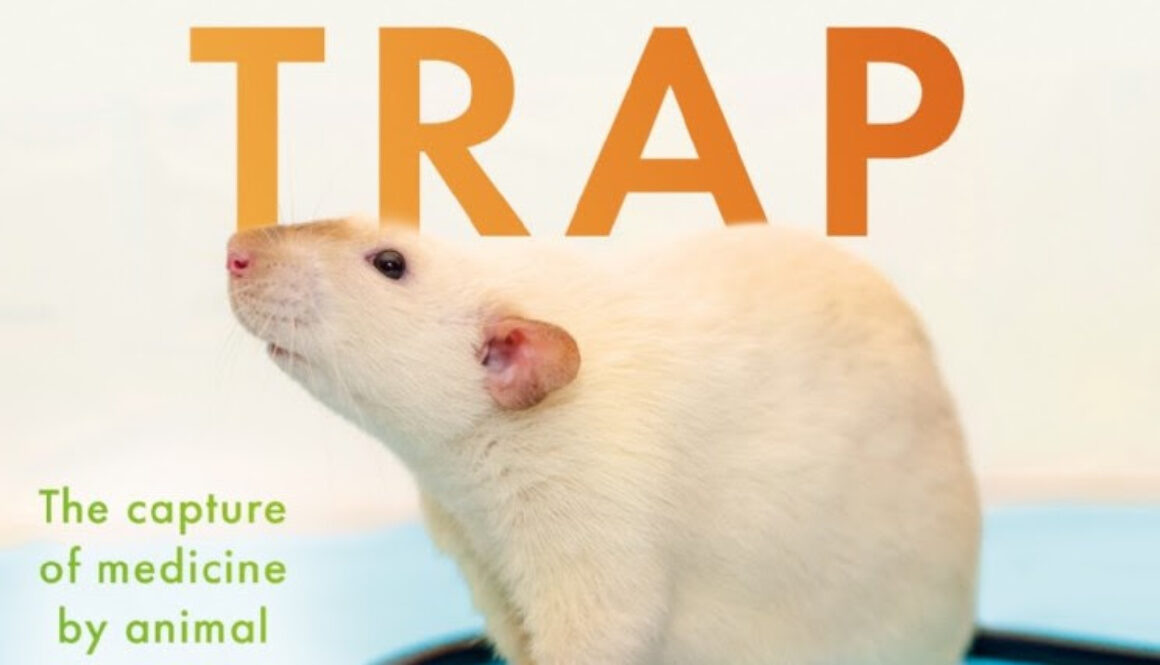Book review Rat Trap
Book review Rat Trap by Pandora Pound (printed 2023 by Troubador Book Publishing)
Kudos to Pandora Pound and the Safer Medicines Trust for producing a work as important as this, with perfect timing, because it fills a huge void on the vast subject of animal experimentation. Timing is important because this book has caught the crest of the wave with respect to technological innovation in the field of non animal and human based methodologies. Equally important is the fact that this book is so accessible to the general public by exposing fact after fact about why animal based research has no place in 21st century science.
The question in everyone’s mind after reading this book will not be « if » animal experiments can be stopped, but « when ». The « Rat Trap » exposes just how deep rooted the animal model paradigm has become in our culture and in our society and explains the enormous resistance on the part of animal researchers and industry to change these bad old habits. Like other major social movements, such as slavery and womens’ rights, it is informed public opinion that is the most powerful force for change to happen.
In an ideal world, a transition from animal to human focused research should be government led, with a view to radically reforming funding and regulations. However, we do not live in an ideal world and if ordinary citizens were to allow things to progress at their current pace, animal experimentation would continue unabated for decades to come, which is exactly what the animal research community would like to see. For example, the Dutch government’s plan to end the use of animals in safety testing met with so much opposition from the scientific community that its 2025 deadline was eventually abandoned (page 206).
It is clear that as informed citizens, we cannot stand idly by while animals continue to serve as living test tubes at a time when the technology is ripe to replace animal testing and animal based research. It is also clear that we would be naive to think that industry intends to « play by the rules » in transitioning from animal testing to human relevant methodologies anytime soon. Historically, it is not the pharmaceutical industry that has led the way in developing new technologies to replace animal tests ; it important to realise that it is the efforts of privately and publicly funded organisations, such as the Wyss Institute for Biologically inspired Engineering that has provided us with 21st century technology, by pioneering devices such as human organs on chips.
Big Pharma possesses all of the necessary resources to promote and validate these 21st century technologies, as well as to steer them through the regulatory maze, provided it is motivated to do so. In an ideal world, Big Pharma should
actively seek to honor its Corporate social responsibility (CSR), which is defined as a business model that helps a company be socially accountable to itself, its stakeholders, and the public. Realistically speaking however, Big Pharma responds primarily to market forces and shareholder demand, as was brilliantly demonstrated by the replacement of live mice for the batch testing of cosmetic Botox products. It was the will of informed shareholders who persuaded the US manufacturer of Botox (Allergan) to develop an animal free test method and to obtain regulatory approval from the FDA in 2011, without the need for any outside government approval.
In the post Covid era, it should be evident to informed citizens that industry and regulators are capable of rapid approval of novel technologies, such as human organs on chips, considering that experimental mRNA vaccine technology was approved in 10 months, instead of the normal 10 year research and development timeline. In view of all of the above, the « Rat Trap » should be compulsory reading for subscribers to the Wall Street Journal and the Financial Times, in addition to all who are fortunate enough to obtain a copy of this remarkable book.




 A recently published article by a team of scientists in Denmark (1) suggests that animal research is undergoing a « domino effect ». The domino effect refers to the knock-on effect of replacing one species of animal by a different species. largely on the basis of strong public opinion. In this example, Danish scientists chose to use pigs instead of monkeys because they consider pig experiments to be less controversial.
A recently published article by a team of scientists in Denmark (1) suggests that animal research is undergoing a « domino effect ». The domino effect refers to the knock-on effect of replacing one species of animal by a different species. largely on the basis of strong public opinion. In this example, Danish scientists chose to use pigs instead of monkeys because they consider pig experiments to be less controversial.